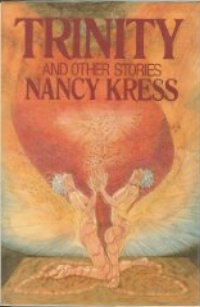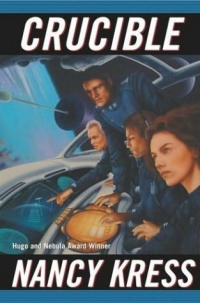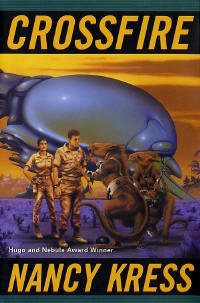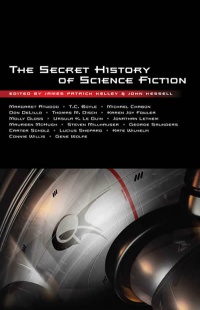 I’ve made comments in the past about the limitations of the short story format, and one thing I mentioned was the lack of room for any serious character development. Well, I have just had the experience of being proven wrong, because I’ve just read Trinity and Other Stories, an exceptional 1985 collection by the talented Nancy Kress. Characterization has always been one of her strong points, and it appears that skill is abundantly present whether she’s writing five pages, or five hundred. These stories contain personalities more complex and compelling than some authors achieve in their novels, and that’s impressive. Going along with that character depth is a keen insight into human nature, emotions, motivations, and shortcomings. And there’s more than great characterization and human insight; most of these stories are built around intriguing ideas as well. There isn’t a lot of “flash” here — aliens, robots, and spaceships are few and far between. The emphasis here is on inner rather than outer space, and fortunately Kress seems comfortable in either realm.
I’ve made comments in the past about the limitations of the short story format, and one thing I mentioned was the lack of room for any serious character development. Well, I have just had the experience of being proven wrong, because I’ve just read Trinity and Other Stories, an exceptional 1985 collection by the talented Nancy Kress. Characterization has always been one of her strong points, and it appears that skill is abundantly present whether she’s writing five pages, or five hundred. These stories contain personalities more complex and compelling than some authors achieve in their novels, and that’s impressive. Going along with that character depth is a keen insight into human nature, emotions, motivations, and shortcomings. And there’s more than great characterization and human insight; most of these stories are built around intriguing ideas as well. There isn’t a lot of “flash” here — aliens, robots, and spaceships are few and far between. The emphasis here is on inner rather than outer space, and fortunately Kress seems comfortable in either realm.
Several of the stories have something to say about art. “With the Original Cast” takes place in a world where reincarnation is real, and past memories can be recovered scientifically via a brain operation. When the director for a production of George Bernard Shaw’s Saint Joan finds a girl who was the actual Joan of Arc in a past life, he imagines casting her in the role and reinvigorating the play like never before. But he learns there’s much more to such an artistic endeavor than historical accuracy; interpretation and acting are, perhaps, far more important. “Shadows on the Cave Wall” explores a similar artistic theme, and addresses the question “what is art for?” The story involves a new trend in publishing that attempts to reduce writing to a cold, logical, scientific process that gives readers exactly what they want, and turns authors into little more than technicians. It also tells us that if art is too perfect, it becomes meaningless. “Ten Thousand Pictures, One Word” is about an artist whose drawings are trying to tell him something about his relationship with his wife; as he refuses to get a clue, both his drawings and his marriage continue to fade away.
Other stories deal more centrally with various human fears, prejudices, or weaknesses. “Explanations, Inc.” is a tale about a business supplying just what its name says, and about one obsessed customer who yearns for answers as a way of battling his deep-seated fear that life has no meaning. “Night Win” deals with a telepathic healer whose job is to save lives, but who is encumbered with a secret death wish. In “Talp Hunt” a woman runs from a shock she can’t face and flees to a simpler life, but one that is confusing and unsettling to her children.
My favorite out of the lot is “Out of All Them Bright Stars.” It’s very short, but I admire a story that can say something meaningful, and say it simply and elegantly in a very short space. It’s about an alien visitor, but the alien is almost a peripheral character. The emphasis is upon a waitress in a small-town diner who is faced with the ugly reality of human bigotry.
There were two or three other stories that didn’t strike me as being of the quality of those above, including the title story. Nevertheless, the majority of the collection was very good, with a few outstanding pieces. Also included is a glowing introduction by Gene Wolfe, and introductions to each story by Kress herself, sharing some background information on where the ideas came from (which I always appreciate). This is one of (I believe) three story collections by Kress, and you can bet I’ll be acquiring the other two somewhere down the road.

 I said in my review for
I said in my review for  Nancy Kress is one of my favorite authors, writing high quality science fiction that adeptly blends well developed characters, absorbing plots, and thought-provoking themes. The latest Kress novel I picked up to read was Crossfire (2003), and as I expected, it did not disappoint. I don’t feel it’s quite in the same league as some of her other work (notably the Sleepless and Probablity trilogies); nevertheless, it’s a solid enough piece of writing and an enjoyable read. Crossfire is a tale of first contact (one of my favorites kinds) built around issues of war, pacifism, conflicting loyalties, personal demons, and inter-species ethics.
Nancy Kress is one of my favorite authors, writing high quality science fiction that adeptly blends well developed characters, absorbing plots, and thought-provoking themes. The latest Kress novel I picked up to read was Crossfire (2003), and as I expected, it did not disappoint. I don’t feel it’s quite in the same league as some of her other work (notably the Sleepless and Probablity trilogies); nevertheless, it’s a solid enough piece of writing and an enjoyable read. Crossfire is a tale of first contact (one of my favorites kinds) built around issues of war, pacifism, conflicting loyalties, personal demons, and inter-species ethics.













